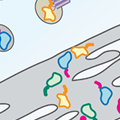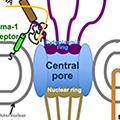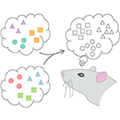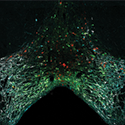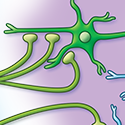Hot Off the Press – April 30, 2021 Published in Cell Reports by Mark Henderson and Kathleen Trychta, et al. In the paper by Henderson et al., we developed a high throughput screen to identify molecules that can stabilize protein homeostasis inside of cells (brain, muscle, liver, etc) during pathological states. The screen was based… [Read More]
Hot off the Press
Ketogenic Diet Reduces Alcohol Withdrawal Symptoms in Humans and Alcohol Intake in Rodents
Hot Off the Press – April 26, 2021 Published in Science Advances by Corinde Wiers and Leandro Vendruscolo, et al. Previous studies reported that people with alcohol use disorder (AUD) use less glucose and more acetate as a source of energy in the brain. This is because alcohol is broken down by the liver into… [Read More]
Past experience shapes the neural circuits recruited for future learning
Hot Off the Press – February 18, 2021 Past is prologue, at least that is the saying. Yet modern behavioral neuroscience, particularly in animals, strives to minimize the effect of past experience, using young and typically naïve subjects for testing. This is done in an effort to understand brain function without the confounding effects of… [Read More]
Sigma-1 receptor chaperones rescue nucleocytoplasmic transport deficit seen in cellular and Drosophila ALS/FTD models
Hot Off the Press – February 9, 2021 A receptor called the sigma-1 receptor, which was discovered at NIDA IRP, plays an important role in regulating the cargo transport between the cellular nucleus and cytoplasm that is dysfunctional in neurodegenerative diseases including amyotrophic lateral sclerosis (ALS) and frontotemporal dementia (FTD). The authors demonstrate and validate… [Read More]
Evolving schema representations in orbitofrontal ensembles during learning
Hot Off the Press – January 3, 2021 Learning what to learn about and generalizing from one situation to another is arguably one of the most fundamental abilities that distinguishes higher intelligence. The effects of the resultant schemas can be seen in simple motor or sensory processing, in which learning one skill facilitates acquisition of… [Read More]
Long-Term Cocaine Self-administration Produces Structural Brain Changes That Correlate With Altered Cognition
Hot Off the Press – December 21, 2020 This paper used longitudinal imaging and neurocognitive assessments in matched experimental and control macaque monkeys to study changes following chronic cocaine self-administration and extended abstinence. True baseline measures prior to any cocaine exposure, something not available in clinical cross-sectional comparisons, permitted a determination of changes in structure… [Read More]
Distinct Signaling by Ventral Tegmental Area Glutamate, GABA, and Combinatorial Glutamate-GABA Neurons in Motivated Behavior
Hot Off the Press – November 23 , 2020 The Ventral tegmental area (VTA) is best known for containing dopamine neurons that play a role in motivated behavior. However, we had previously demonstrated that the VTA has neurons that co-transmit glutamate and GABA, neurons that transmit glutamate without GABA, and neurons that transmit GABA without… [Read More]
Processing in Lateral Orbitofrontal Cortex Is Required to Estimate Subjective Preference during Initial, but Not Established, Economic Choice
Hot Off the Press – November 23 , 2020 Adaptive decision making requires us to imagine – or mentally simulate – potential outcomes, particularly when potential outcomes are far off, uncertain, or even anecdotal. This ability depends in part on the orbitofrontal cortex (OFC) , an important part of the frontal lobe altered in addiction…. [Read More]
In a Rat Model of Opioid Maintenance, the G Protein-Biased Mu Opioid Receptor Agonist TRV130 Decreases Relapse to Oxycodone Seeking and Taking and Prevents Oxycodone-Induced Brain Hypoxia
Hot Off the Press – November 17 , 2020 Bossert et al. used a rat model of opioid agonist maintenance therapy to study the effect of the novel G-protein-biased mu opioid receptor (MOR) agonist TRV130 on relapse oxycodone seeking and taking during abstinence. They showed that TRV130 decreased oxycodone seeking and taking during abstinence in… [Read More]
VTA Glutamatergic Neurons Mediate Innate Defensive Behaviors
Hot Off the Press – November 11 , 2020 The role of ventral tegmental area (VTA) in motivated behavior is well established. However, Barbano et al., demonstrated that a subset of VTA neurons, that utilizes glutamate as signaling molecule, mediates innate defensive behaviors, evolutionary selected responses that promote escaping from dangerous situations. Alterations in innate… [Read More]

